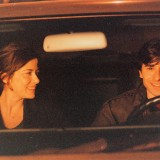 Writing about this film, I decided not to talk about the plot, actors, angles, the director personal story-drivers and focus on just one aspect.
Writing about this film, I decided not to talk about the plot, actors, angles, the director personal story-drivers and focus on just one aspect.
The Luce dei miei occhi soundtrack.
More often than not films’ soundtracks receive minor exposure, like the drummer who is sitting in the back where the lead-singer – in our context actors and director – receive all the attention. True, masterpieces from masters like Ennio Morricone usually can’t be ignored, but overall the trend is real.
Think about it, if you remove the soundtrack from a film, all of a sudden the film becomes a recorded outdoor theater performance. Nothing wrong with that, but it will miss an important channel of communication. As you know the director can deliver her message by non-verbal body language, dialogs, visual angles, smart editing, and finally by music to set a specific tone.
Naturally, a lot of how we associate music to positive or negative plot developments is a result of ongoing learning where composers fulfill our expectations using a consistent vocabulary. In this sense, a tense tempo would support a tense scene and not a light slapstick. And there are always deviations from such mainstream approach if we take for example Pasolini’s 1961 Accatone, where seemingly out of place classical music by Bach provides an epic undertone to the violent life of a pimp in Rome’s slums.
In this film, sentiments of utter loneliness and melancholy are sensibly delivered through original music by composer Ludovico Einaudi. The haunting score uses minimalist piano pieces layered over occasional mounting violin crescendos – opens up a rich world of expression and depth. No wonder it won best sound track at the 2002 Italian music awards.
Einaudi’s signature style, as manifested in several other films, offers “an ambient, meditative and often introspective, drawing on minimalism, world music, and contemporary pop” (source: Wikipedia). In this sense, I believe Einaudi’s score is a natural and updated progression to another legendary composer – Giovanni Fusco whose minimalist piano treatments in Antonioni’s 1957 The Cry (Il Grido) paints a similar brooding ambiance.
Einaudi-Piccioni successful collaboration has already started in 2000 with Out of This World (Fuori dal mondo). Some of his prominent albums include Divenire (2007; piano, orchestra) and Una Mattina (2004; piano).
What a pleasant discovery!


Where can I get the soundtrack for this movie “Luce Dei Miei Occhi”?????
Mitch
Hi Mitch, I just posted the link to soundtrack on the post: http://www.cafepellicola.com/2008/05/03/light-of-my-eyes-luce-dei-miei-occhi-giuseppe-piccioni-2001/
Enjoy!
Shlomi.
Thanks so much for the link! I’ve been looking for that soundtrack on and off for almost 10 years now. I just downloaded the mp3s from Amazon since $31 was a little more than I’d want to spend on a CD!